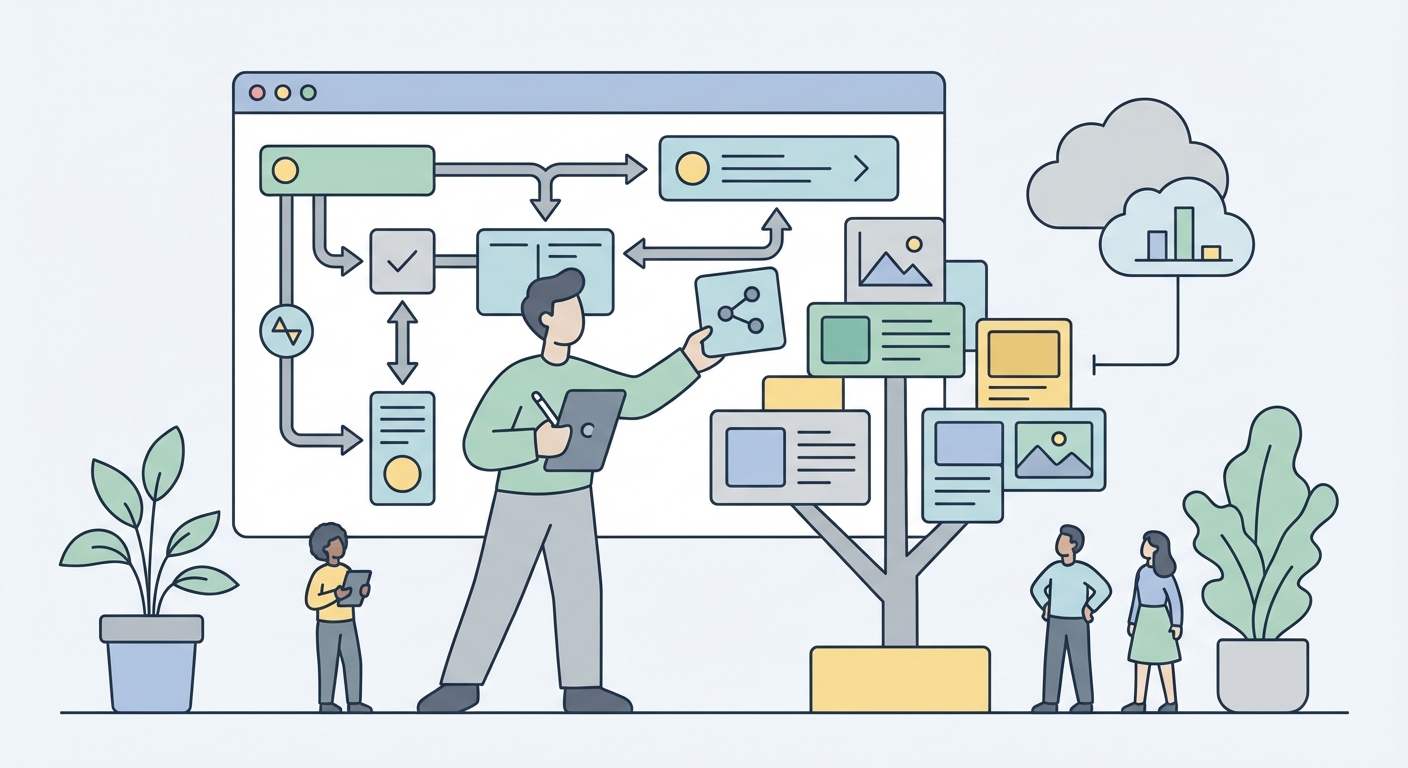Mastering AI-Powered Research: A Comprehensive Guide
TL;DR
- This guide dives deep into using artificial intelligence for research, especially for content creation and social media marketing. It covers essential ai tools, effective strategies for leveraging ai in various platforms like Instagram, Facebook, and YouTube, and offers practical tips for optimizing content workflows. Learn how ai can streamline research, improve content quality, and boost engagement.
Introduction: The Rise of AI in Research
Okay, so, here's the thing: research is changing. Fast. Remember when you had to spend hours, days even, digging through journals? Yeah, ai is kinda making that obsolete.
Speed and efficiency? Absolutely. ai tools can sift through massive datasets in minutes. (Using AI for Data Analysis: The Ultimate Guide (2025) - Luzmo) Think about that for a sec, like, what you could do with all that extra time? Healthcare, for example, could see faster drug discovery. (Artificial Intelligence (AI) Applications in Drug Discovery and Drug ...)
Accuracy is getting a boost, too. We're talking fewer errors, better insights. It's not perfect, i guess, but it's getting really good at picking out patterns humans would miss.
And the data? Forget about being limited by what you can physically access. ai opens up everything. Imagine retailers using global data to predict trends way before they even happen.
It's not a magic bullet, but ai is def shaking things up. Content creators need to pay attention because staying ahead of the curve is crucial for relevance and gaining a competitive edge in today's fast-paced digital landscape. To help you navigate this evolving landscape, we'll now explore some essential AI research tools specifically designed for content creators.
Essential AI Research Tools for Content Creators
Ever feel like you're drowning in data but thirsty for knowledge? Well, you're not alone. Here's a few ai-driven social listening tools to help content creators out:
Okay, so Brandwatch...it's not just another social listening tool. It's like, a whole platform. Imagine being able to track every single mention of your brand, or your competitor's brand. Like, everywhere. It crawls through social media, forums, blogs, the whole shebang. The cool thing is, it doesn't just tell you what people are saying, but how they feel about it. Sentiment analysis, baby! This means understanding if the mentions are positive, negative, or neutral.
Sentiment Analysis: This is huge. Brandwatch uses ai to figure out if a mention is positive, negative, or neutral. So, if you release a new product, you can see instantly if people are loving it or hating it.
Competitor Analysis: Keep tabs on what your rivals are up to. What campaigns are working for them? Where are they getting traction? You can basically reverse-engineer their success (or learn from their failures).
Trend Identification: Spot emerging trends before they blow up. This is gold for content creators. Imagine being the first to jump on a hot topic.
Sprout Social is another player. It's more than just social listening; it’s a full-on social media management platform. But their listening features are, like, pretty darn good.
Smart Inbox: All your mentions, messages, and comments in one place. No more hopping between platforms. It's a total lifesaver.
Keyword Tracking: Set up keywords related to your niche or industry. Sprout Social will track them across various social networks. Find out what questions people are asking and create content that answers them.
Reporting: Get detailed reports on your social media performance. See what's working, what's not, and adjust your strategy accordingly.
Mention...does what it says on the tin. It monitors the web for mentions of your brand, keywords, or competitors. It's, like, pretty straightforward, but powerful.
Real-Time Alerts: Get notified instantly when someone mentions your brand. This is crucial for responding to customer inquiries or addressing negative feedback quickly.
Influencer Identification: Find the influencers who are already talking about your brand or industry. Reach out to them for collaborations or partnerships.
Multi-Language Support: Track mentions in multiple languages. This is essential if you have a global audience.
These tools aren't just for big corporations, either. Small businesses and solo content creators can totally benefit from them. Now that we've explored some essential AI research tools, let's dive into how you can leverage these capabilities for specific social media platforms.
Leveraging AI for Social Media Research: Platform-Specific Strategies
Okay, so you're probably thinking, "Social media research? Isn't that just scrolling through feeds?" Nah, it's way more than that now, especially with ai in the mix. Each platform has its own weird little ecosystem, and ai can help you navigate them.
Instagram, right? Land of influencers and pretty pictures. But beneath all that, there's a ton of data. ai can help you dig it up.
Using ai to identify trending hashtags: Forget guessing which hashtags are hot. ai tools can analyze real-time usage data to pinpoint the hashtags that are actually trending right now. This is gold if you're trying to get your content seen. Imagine a small, local bakery using ai to find out that #NationalDonutDay is trending in their area. They could then post a drool-worthy picture of their donuts with that hashtag and reach a whole new audience.
Analyzing competitor strategies with ai: Ever wonder what your competitors are doing on Instagram? ai can snoop...err, I mean, analyze their content. It can see which hashtags they're using, what kind of posts get the most engagement, and even what time of day they're posting. Then, you can use that info to refine your own strategy.
Predicting future trends on Instagram: This is where it gets a little sci-fi. ai can analyze past trends to predict what's going to be big in the future. Think fashion retailers using ai to predict the next big clothing trend, months before it hits the mainstream. They can then stock up on those items and be ahead of the curve.
Facebook: It's not just for sharing vacation pics with your aunt anymore. It's a goldmine of audience data!
Understanding audience demographics with ai: ai goes way beyond basic demographics. We're talking about interests, behaviors, and even purchase patterns. A local bookstore can use ai to identify Facebook users in their area who are interested in specific genres, like sci-fi or mystery. Then, they can target those users with ads for new releases or author events.
Optimizing content for maximum engagement: ai can analyze your past posts to see what kind of content resonates with your audience. What kind of images do they like? What kind of headlines grab their attention? A non-profit could use ai to determine which types of stories get the most donations and then focus on creating more of that content.
Identifying viral content patterns: What makes a post go viral? ai can help you figure it out by analyzing the characteristics of past viral posts. A news organization could use ai to identify the key elements that make a story shareable and then incorporate those elements into their own reporting.
Twitter/X is like the world's biggest water cooler. It's where people go to vent, share news, and just generally shout into the void. ai can help you make sense of all the noise.
Tracking brand sentiment with ai: Find out what people really think about your brand. ai can analyze tweets to determine whether they're positive, negative, or neutral. A restaurant chain can use ai to monitor tweets about their food and service. If they see a lot of negative sentiment, they can quickly address the issues and improve customer satisfaction.
Identifying influencers and key opinion leaders: Who's talking about your industry? ai can help you find the influencers who have the most reach and influence. A tech company can use ai to identify the top tech bloggers and journalists on Twitter and then reach out to them for product reviews or interviews.
Monitoring conversations and trends in real-time: Stay on top of breaking news and emerging trends. ai can monitor Twitter for relevant keywords and hashtags and alert you to anything that's gaining traction. A marketing agency can use ai to monitor conversations about a new product launch and then adjust their marketing strategy accordingly.
See how this all connects? ai helps you understand the data, so you can create better content and get better results. Now that we've explored the powerful techniques AI offers for content research, let's focus on how to seamlessly integrate these into your daily content creation process to optimize your workflow.
AI-Powered Techniques for Content Research
Okay, so, get this: remember spending hours manually collecting data? Yeah, ai can automate that stuff now. It's not just about saving time; it's about uncovering insights you'd probably miss otherwise.
Using AI to scrape and analyze data from multiple sources: Forget manually copying and pasting stuff from websites. ai-powered tools, like web scraping platforms or custom scripts using libraries such as Beautiful Soup in Python, can automatically scrape data from websites, social media, and even those dusty old online archives. Imagine a financial analyst using ai to pull real-time stock data from dozens of sources, then analyzing it to identify investment opportunities. It's like having a super-efficient research assistant that never sleeps, you know?
Creating custom datasets for specific research needs: Sometimes, off-the-shelf datasets just don't cut it. With ai, you can build your own custom datasets tailored to your exact needs. Let's say you're a healthcare researcher studying the effects of a new drug. You could use ai-powered data collection tools or APIs to pull data from patient records, clinical trials, and scientific publications to create a dataset that's perfectly suited to your research question.
Automating repetitive research tasks: Let's be real, a lot of research is just plain boring. ai can take over those repetitive tasks, freeing you up to focus on the interesting stuff. Think about a market researcher who needs to analyze thousands of customer reviews. Instead of reading them all manually, they could use ai-powered text analysis tools to automatically extract key themes and sentiments.
Extracting key insights from large volumes of text using Natural Language Processing (NLP): Imagine trying to sift through thousands of pages of legal documents to find the key clauses that matter. ain't nobody got time for that! NLP libraries like spaCy or NLTK can automatically extract the important stuff, like names, dates, and key terms. A law firm could use this to quickly identify relevant information in a complex case.
Identifying sentiment and emotion in written content with NLP: It's not always enough to know what people are saying; you also need to know how they feel. NLP can analyze text to determine whether it's positive, negative, or neutral. A retail company could use this to monitor customer feedback and identify potential problems before they blow up.
Summarizing and paraphrasing text automatically with NLP: Need to quickly get the gist of a long article or report? NLP can automatically summarize the key points. A journalist could use this to quickly research a topic before writing a story, saving them a ton of time.
Predicting future trends and patterns using Machine Learning (ML): Wanna know what's gonna be hot next year? Machine learning algorithms, often found in predictive analytics platforms, can analyze past data to predict future trends. A fashion retailer could use this to predict which styles will be popular next season and stock up accordingly.
Identifying potential risks and opportunities with ML: Every business faces risks and opportunities. Machine learning can help you identify them before they become a problem (or a missed chance). A financial institution could use ML models to predict which loans are most likely to default.
Forecasting content performance with ML: Ever wonder what content will resonate with your audience? Machine learning can analyze past performance to predict how well a piece of content will do. A marketing agency could use ML to optimize their content strategy and get more engagement.
Identifying objects and scenes in images and videos using Computer Vision: ai can "see" what's in an image or video, automatically identifying objects, people, and scenes. Computer vision tools, often integrated into content moderation platforms, can monitor surveillance footage and automatically detect suspicious activity.
Analyzing visual trends and aesthetics with Computer Vision: What makes an image visually appealing? ai can analyze visual elements to identify trends and aesthetics. An advertising agency could use computer vision tools to create more effective ads.
Detecting copyright infringement with Computer Vision: Worried about someone stealing your images or videos? ai can automatically detect copyrighted content. A photography website could use computer vision tools to protect their intellectual property.
So, yeah, ai-powered research is kind of a big deal. It's not just about making things faster; it's about unlocking new insights and possibilities. Having explored the powerful techniques AI offers for content research, let's now focus on how to seamlessly integrate these into your daily content creation process to optimize your workflow.
Optimizing Your Content Workflow with AI Research
Okay, so, you're cranking out content, right? But are you really making the most of your time? ai research can totally change the game, like, seriously. It's all about working smarter, not harder.
Let's face it: research can be a time sink. ai can help you reclaim those hours.
Reducing the time spent on manual research: ai tools can sift through tons of data way faster than you ever could. Imagine a healthcare content creator needing to research the latest studies on diabetes. ai could pull relevant articles and summarize key findings in minutes, saving hours of manual searching through medical journals.
Improving the accuracy and reliability of research findings: ai algorithms can identify biases and inconsistencies in data, leading to more reliable results. Think about a financial blogger using ai to analyze market trends. The ai could flag potential data manipulation or unreliable sources, helping the blogger present a more accurate and trustworthy analysis to their audience.
Accessing a wider range of data sources: ai can tap into databases and archives you might not even know existed. A travel blogger, for example, could use ai to access obscure historical records and local insights, creating richer and more unique content for their readers.
It's not just about speed; it's about making better content, too.
Creating more relevant and engaging content: ai can analyze audience data to identify their interests and preferences, helping you tailor your content accordingly. A food blogger, for instance, could use ai to analyze reader comments and social media activity to discover what recipes are trending and what dietary restrictions their audience has, ensuring their content is always on point.
Improving the clarity and readability of content: ai-powered writing assistants can help you refine your writing style, making it easier for your audience to understand and engage with your content. A tech blogger, for example, could use ai to simplify complex technical jargon, making their articles more accessible to a wider audience.
Personalizing content for specific audiences: ai can help you segment your audience and create personalized content experiences for each group. A marketing blogger, for example, could use ai to create different versions of their content for different industries, ensuring that each reader receives information that's directly relevant to their needs, you know?
Okay, so, I gotta mention Social9. It's, like, a really cool platform that uses ai to help you create and optimize your social media content.
- Leverage Social9's ai-powered generation to create engaging social media content: Social9 can automatically generate captions, hashtags, and even entire posts based on your topic and target audience. This is informed by its ability to analyze trending topics and audience engagement patterns, thus directly contributing to research optimization by suggesting content that's likely to perform well.
- Utilize Smart Captions and Hashtag Suggestions to boost your posts' visibility: Social9's ai algorithms can suggest the most relevant and trending hashtags for your niche, helping you reach a wider audience. This is based on its underlying research into what's currently resonating.
- Access content templates and 24/7 support to streamline your content creation process. Social9 offers a library of pre-designed templates and round-the-clock support to help you create awesome content quickly and easily.
To effectively leverage AI in your content research, start by exploring the tools mentioned, experiment with platform-specific strategies, and always prioritize ethical considerations.
Ethical Considerations and Best Practices for AI Research
Okay, so, ai research is cool and all, but like, what about the ethics? It's not all sunshine and rainbows, ya know? We gotta be responsible here.
Data Privacy is kinda huge: You can't just go hoovering up everyone's data without their consent. Think GDPR, CCPA – those rules are there for a reason. For example, if you're doing market research, make sure you're anonymizing the data, or like, getting explicit consent.
Bias in algorithms is a sneaky problem: ai models can accidentally perpetuate existing biases if they're trained on biased data. Imagine a recruiting tool that's trained on mostly male resumes. It might unfairly penalize female candidates, so, really not cool.
Transparency is key: People should know how ai is being used in research. If you're using ai to analyze customer feedback, be upfront about it. Don't try to hide it, because that's just shady.
It's all about using ai responsibly.
Conclusion: The Future of AI in Content Research
The future of content research? It's less crystal ball, more, like, super-charged data analysis. ai isn't just a tool anymore; it's becoming the co-pilot.
- algorithms are getting smarter, faster. Think, ai that can not just find data, but understand it like a human (but, you know, without the coffee breaks).
- ai tools everywhere. From social listening platforms to content creation suites. The trick? Figuring out which ones actually deliver the goods and which are just hype.
- content workflows integrating AI. ai is becoming seamless, it's not a separate step, it's woven into the whole process.
To effectively leverage AI in your content research, prioritize understanding your audience through AI-powered social listening, experiment with platform-specific strategies, and always maintain ethical considerations. The future of content research is here; embrace it by continuously learning and adapting.





